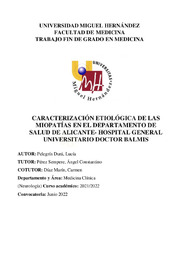Resumen :
FUNDAMENTOS: Las miopatías constituyen un heterogéneo grupo de enfermedades que afectan al músculo esquelético con importante impacto en la calidad de vida. La identificación precoz de la etiología permite un adecuado manejo del paciente, sin embargo, no existen en nuestro medio estudios de frecuencia global, centrándose la mayoría de estos en un tipo o subtipos de miopatías concreto. El objetivo de este estudio es estimar la prevalencia de miopatías en el departamento del Hospital General Universitario Doctor Balmis de Alicante y así conocer las características clínicas y demográficas de los pacientes de nuestro Departamento de Salud.
MATERIAL Y MÉTODOS: Se realizó un estudio observacional retrospectivo de 136 pacientes con diagnóstico codificado de miopatía en el Departamento de Salud de Alicante. Se revisaron las historias clínicas y se recogieron variables demográficas (edad y sexo), clínicas (inicio de la clínica, clínica típica, resultados de pruebas complementarias), genéticas y de morbi-mortalidad (afectación cardio-respiratoria y mortalidad). Los datos fueron analizados mediante los softwares estadísticos R y SPSS.
RESULTADOS: La prevalencia global de miopatías en el departamento del HGUDB fue de 47,05 casos por 100.000 habitantes (IC 95%: 39,52 -55,98). La prevalencia fue significativamente mayor en el grupo de miopatías genéticas (27,45/100.000 habitantes) en comparación con los otros subgrupos. La edad media de los casos fue de 51,86 ± 17,1 años sin mostrar predominio por ningún sexo (48,5% varones y 51,5% mujeres). Observamos un 58, 33% de los casos de etiología genética, un 9,85% de causa adquirida y un 31,8% de causa desconocida. Los estudios moleculares mostraron alteraciones en un 70,41% de los casos y obtuvimos variantes patogénicas no descritas previamente en los genes SMCHD1 y FLNC.
CONCLUSIONES: La prevalencia de miopatías en el HGUDB es algo mayor a lo esperado en el resto del mundo y similar a otros estudios españoles. La distribución por etiologías fue congruente con lo que muestra la literatura. No obstante, serán necesarios estudios
en pacientes de diferentes procedencias para obtener una mejor aproximación de la prevalencia global de estas patologías.
BACKGROUND: Myopathies constitute a heterogeneous group of diseases affecting skeletal muscle with important impact on quality of life. The early identification of the etiology allows an adequate management of the patient; however, there are no studies of global frequency in our environment, most of them focusing on a specific type or subtypes of myopathies. The aim of this study is to estimate the prevalence of myopathies in the Doctor Balmis General Hospital of Alicante and thus to know the clinical and demographic characteristics of patients in our Health Department.
MATERIAL AND METHODS: A retrospective observational study of 136 patients with a coded diagnosis of myopathy in the Alicante Health Department was carried out. Medical records were reviewed and demographic (age and sex), clinical (clinical onset, typical clinic, results of complementary tests), genetic and morbi-mortality (cardio-respiratory involvement and mortality) variables were collected. Data were analyzed using R and SPSS statistical software.
RESULTS: The overall prevalence of myopathies in the department of HGUDB was 47,05 cases per 100,000 population (95% CI: 39,52 -55,98). The prevalence was significantly higher in the genetic myopathy group (27,45/100,000 population) compared to the other subgroups. The mean age of the cases was 51,86 ± 17,1 years without showing predominance by either sex (48,5% males and 51,5% females). We observed 58,33% of the cases of genetic etiology, 9,85% of acquired cause and 31,8% of unknown cause. Molecular studies showed alterations in 70,41% of the cases and we obtained previously undescribed pathogenic variants in the SMCHD1 and FLNC genes.
CONCLUSIONS: The prevalence of myopathies in HGUDB is somewhat higher than expected in the rest of the world and similar to other Spanish studies. The distribution by etiology was congruent with what is shown in the literature. However, studies in patients from different backgrounds will be necessary to obtain a better approximation of the overall prevalence of these pathologies.
|

 La licencia se describe como: Atribución-NonComercial-NoDerivada 4.0 Internacional.
La licencia se describe como: Atribución-NonComercial-NoDerivada 4.0 Internacional.
.png)